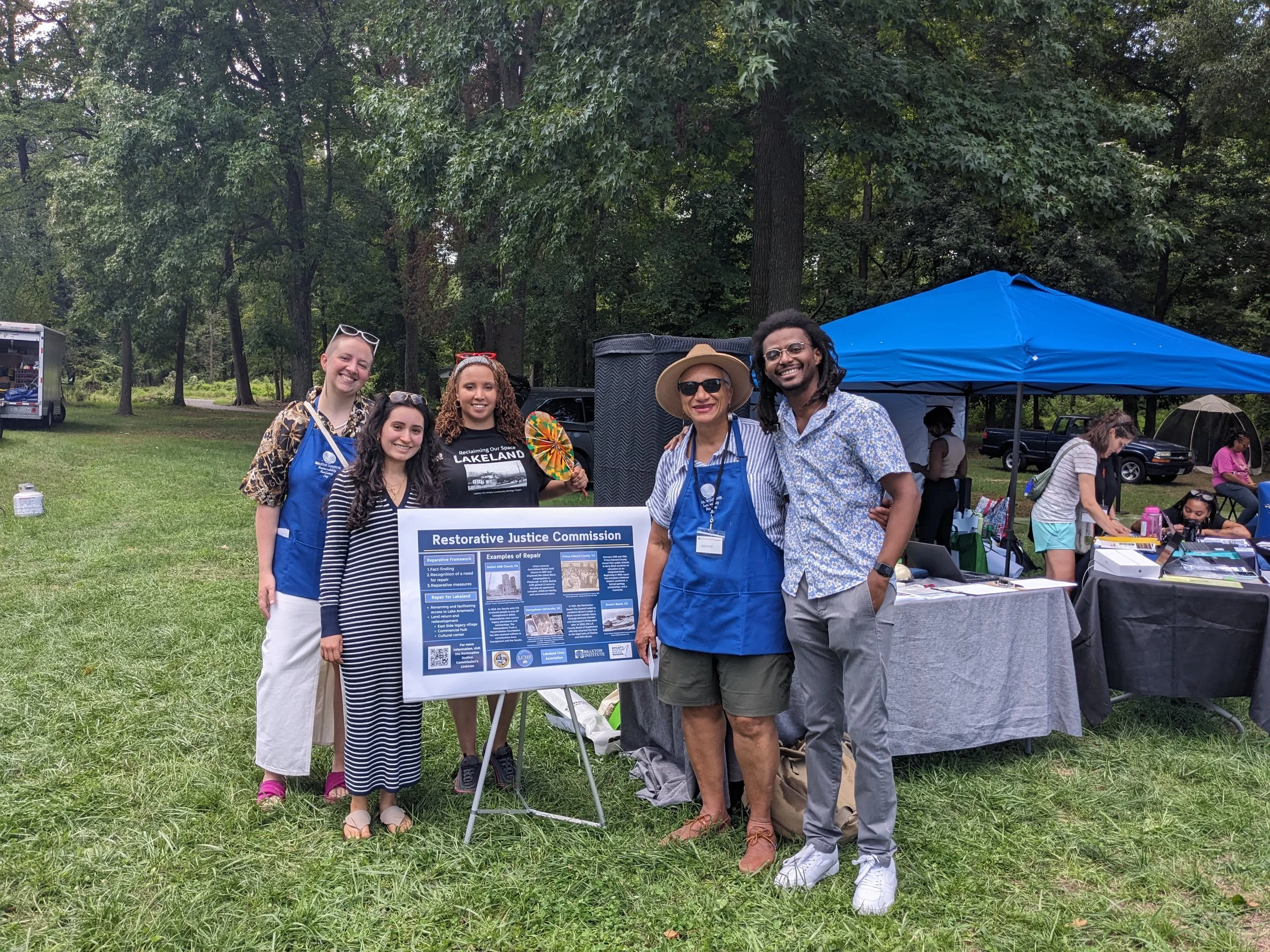Lakeland Community leaders gather to clarify Reparative Action Priorities at “Organizing for Repair,” May 18, 2024
The release of Restorative Justice for Lakeland: A Report of Historical Harms, Contemporary Impacts, and Policies for Redress marks a milestone in a long and ongoing struggle. It also marks something more: an affirmation of presence, memory, and power. It is now impossible to erase Lakeland from its history—or from its future.
In a spirit of collaboration and shared commitment, the Braxton Institute for Sustainability, Resiliency and Joy (BI) and the African-American Redress Network (AARN), have worked together over the past six months to prepare a comprehensive documentation of harm that extensively records the history and negative impacts of urban renewal on Lakeland, the historic black town now incorporated into the City of College Park, Maryland.
The Braxton Institute’s contributions reflect decades of commitment to restorative justice and community leadership in Lakeland. The founder of the Braxton Institute, whose family has been part of Lakeland for over 120 years, has been a voice for Lakeland since the 1970’s. After the City of College Park formally apologized in 2020 for its role in harms to Lakeland, she organized training for community leaders in the principles of restorative justice. The City then went on to establish the Restorative Justice Commission. In the Spring of 2024, the Braxton Institute launched its Reparations for Lakeland Now! campaign to support the Commission’s work. Reparations for Lakeland Now! laid the groundwork for a harm report with a series of educational events, storytelling opportunities, trauma-informed community gatherings, and specialized consultation with social psychiatrist Mindy Fulilove, M.D. This work articulated and documented the “Five Pillars of Beloved Community” – necessary components of a healthy urban environment – that were well-established by Lakelanders and enjoyed in Lakeland before Urban Renewal. In the historic May 2024 Lakeland Community Convening: Organizing for Repair, the Braxton Institute brought together leaders from the Lakeland Civic Association, the Lakeland Community Heritage Project, the Restorative Justice Commission, religious leaders, and a doctoral candidate in Urban Planning at the University of Maryland. Facilitated by Braxton Institute VP, Richael Faithful, Esq. Organizing for Repair identified community Reparative Action Priorities (RAPS) as well as strategic next steps.
Upon the recommendation of the City of College Park Restorative Justice Commission, the City contracted with the African-American Redress Network in late fall of 2024 for a key next step: to undertake the formal process of compiling a comprehensive harm report. From February 2025 through June 2025 the Braxton Institute and the African American Redress Network operated under a written agreement to advance redress, historical truth-telling, and community healing, specifically for Lakeland. During this time, members of the Braxton Institute Reparations for Lakeland Now! team and AARN met virtually at least once a month to share and to align research and deepen the partnership, contributing historical materials, strategic insight, and editorial feedback to support the report’s development. Along with Dr. Braxton, Rebecca Parker and Nicole Oxendine collaborated with AARN team members Jessia Avila and Linda Mann, reviewing documentation and the draft harm report. The Braxton Institute also provided access to source material from The Braxton Institute Archives, including documentation from our community-led research, to enrich AARN’s research and public-facing documents.
In May and June of 2025, Braxton, Parker and Oxendine joined with AARN and members of the Lakeland Community in two 6-hour workshop sessions at the newly renamed Lakeland College Park Community Center in Lakeland and the College Park City Hall. AARN graciously extended floor time and editorial access to the Braxton Institute, ensuring that community-rooted voices remained present at every stage.
The Braxton Institute gives thanks for the care and consideration shown in AARN’s acknowledgement of the earlier work of the Braxton Institute and the Lakeland Community Heritage Project and the ways in which AARN has built on BI’s accumulated knowledge and wisdom. We are also grateful for the new knowledge and documentation they unearthed—evidence that Lakelanders might otherwise have found difficult if not impossible to uncover or access. That documentation of harm has sometimes been difficult to face for all involved, but it corroborates what Lakelanders have long suspected, known in part, or felt in our bones.
Our conclusions for redress and repair, while not identical to AARN’s, are complementary. We applaud the work of the AARN and its impressive report, which is now part of a growing body of evidence presented to local government and the community to inform reparative action to come. We look forward to building on this strategic collaboration and taking the next steps to bring justice for Lakeland. Thank you, AARN!
The Braxton Institute and AARN at Lakeland Community Day 2024




